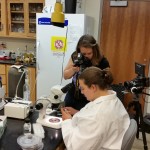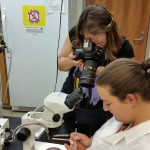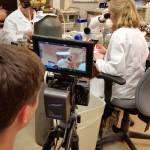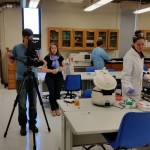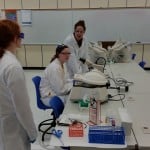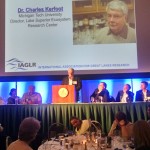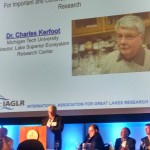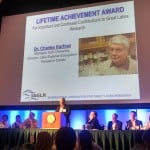 Xiaoqing Tang (Bio Sci) received a $75,000 research contract from the U.S. Highbush Blueberry Council for the project Blueberry Protects Pancreatic Beta-Cells
Xiaoqing Tang (Bio Sci) received a $75,000 research contract from the U.S. Highbush Blueberry Council for the project Blueberry Protects Pancreatic Beta-Cells
 Xiaoqing Tang (Bio Sci/LSTI) has received a $421,652 grant from the US Department of Health and Human Services, National Institutes of Health for the research project, Role of miR-483 in Pancreatic Alpha and Beta Cells. This is a three-year project.
Xiaoqing Tang (Bio Sci/LSTI) has received a $421,652 grant from the US Department of Health and Human Services, National Institutes of Health for the research project, Role of miR-483 in Pancreatic Alpha and Beta Cells. This is a three-year project.
 Dr. Werner gave a short interview to the Michigan Radio Network discussing his research on cancer using fruit flies as a model. You can hear it below.
Dr. Werner gave a short interview to the Michigan Radio Network discussing his research on cancer using fruit flies as a model. You can hear it below.
Michigan Tech rented a HD camera (same model as the ones used for filming the “Hobbit” movie). We also set up some photo shoots in Dr. Werner’s lab and the Medical Laboratory Science teaching lab with Brigitte Morin and Karyn Fay.

 Amy Marcarelli (Bio Sci) is one of the authors of A critical assessment of the ecological assumptions underpinning compensatory mitigation of salmon-derived nutrients. In the May online issue of Environmental Management.
Amy Marcarelli (Bio Sci) is one of the authors of A critical assessment of the ecological assumptions underpinning compensatory mitigation of salmon-derived nutrients. In the May online issue of Environmental Management.
*****
Marcarelli, Ashley Coble (GLRC) and Evan Kane (SFRES) authored Ammonium and glucose amendments stimulate dissolved organic matter mineralization in a Lake Superior tributary in the Journal of Great Lakes Research.
*****
Earlier this month, Coble also had another paper, Strontium source and depth of uptake shifts with substrate age in semiarid ecosystems, published in the Journal of Geophysical Research – Biogeosciences based on her MS research at Northern Arizona University.
Original Tech Today article
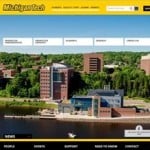 For the next several days the University’s home page has an areal view of campus. Prominently shown in the shot are several facilities that Biological Sciences uses for research and instruction including:
For the next several days the University’s home page has an areal view of campus. Prominently shown in the shot are several facilities that Biological Sciences uses for research and instruction including:
The Great Lakes Research Center
The Dow Environmental Sciences and Engineering Building
The R.L. Smith Mechanical Engineering-Engineering Mechanics Building.
You’ll also notice at the bottom of the photo the University’s research vessel the SV Polar; Dr. Marcarelli just happens to be on the vessel when this shot was taken, working on her collaborative water millfoil invasive species project.
 From Tech Today:
From Tech Today:
Casey Huckins, (Bio Sci/GLRC) is the principal on a research project that received a $331,979 research grant from the Michigan Department of Natural Resources. The project is titled, Innovative and Multifaceted Control of Invasive Eurasian and Hybrid Watermilfoil Using Integrative Pest Management Principles.
Also involved in the project are Amy Marcarelli (Bio Sci), Erika Hersch-Green (Bio Sci) and Colin Brooks (Michigan Tech Research Institute).
This funding is part of the new MDNR Michigan Invasive Species Grants Program (MISGP)
 May 4, 2015—
May 4, 2015—
By Mark Wilcox
Research indicates human activities have altered the global nitrogen cycle as much or more than the global carbon cycle. Yet it seems the public is far less aware of these changes.
In the world of aquatic biology, it’s a long-held belief that what goes up, must come down. As human activity causes nitrogen loads to go up along the banks of rivers and streams, nitrogen levels go down through another process. Amy Marcarelli, a Michigan Technological University associate professor in biological sciences, has received a CAREER Award from the National Science Foundation (NSF) to study this nitrogen conversion balance.
She’s looking at two biological processes: nitrogen fixation and denitrification. Nitrogen fixation is sort of like a magic show where microbes take nitrogen out of thin air, turning it into a usable form for all organisms. The trick is in the biogeochemical process, which partitions and cycles chemical elements and compounds between the living and nonliving parts of an ecosystem. The process is more or less reversed in denitrification, with the gases released into the atmosphere. The result should be a net reduction in nitrogen loads in rivers and streams. Although nitrogen fixation could offset nitrogen losses from denitrification, we know little about where and when it occurs in streams and rivers, and how it responds to human activities.
Marcarelli is looking to apply updated analytical techniques and models to test alternative hypotheses regarding how the balance between nitrogen fixation and denitrification influences nitrogen loads in streams and rivers.
With funding from the CAREER award, Marcarelli and her team will help create more accurate nitrogen budgets and models which are needed to better understand and manage the human effects on nitrogen cycling at both regional and global scales.
The CAREER awards are prestigious grants from the NSF to young faculty who effectively integrate research and teaching. Marcarelli was awarded a 5-year, $794,661 grant to continue her research into nitrogen fixation and denitrification.
Not only will her research look to affirm, or disprove, long-held beliefs, but also to create a more ecologically-savvy citizenry by integrating ecosystem ecology techniques into K-12 and undergraduate education.
 June 5, 2015—
June 5, 2015—
For being so small, fruit flies have had a large impact on genetic research. Thomas Werner, an assistant professor of biological sciences at Michigan Technological University, has bridged the miniscule and the massive in an effort to better understand the mechanisms behind several unique features of fruit fly genes.
Over the past week, several studies that Werner co-authored have been published in PLoS ONE, the Proceedings of the National Academy of Sciences, and Nature Education. All are linked by Drosophila—a genus of fruit flies—and the insights that fruit fly genetics provide on human health, specifically cancer-causing genes.
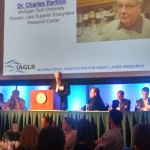 Professor Charles Kerfoot (BioSci) has received the 2015 IAGLR Lifetime Achievement Award from the International Association for Great Lakes Research. The award recognizes important and continued contributions to the field of Great Lakes research for 20 years or more. In a letter notifying Kerfoot of the award, Douglas D. Kane, president of the IAGLR, congratulated him on an “incredibly productive and significant career.”
Professor Charles Kerfoot (BioSci) has received the 2015 IAGLR Lifetime Achievement Award from the International Association for Great Lakes Research. The award recognizes important and continued contributions to the field of Great Lakes research for 20 years or more. In a letter notifying Kerfoot of the award, Douglas D. Kane, president of the IAGLR, congratulated him on an “incredibly productive and significant career.”
Dr. Kerfoot will be presenting at IAGLR 2015 (http://www.iaglr.org/iaglr2015/) on how Bythotrephes affects zooplankton community composition, at the University of Vermont in late May.
